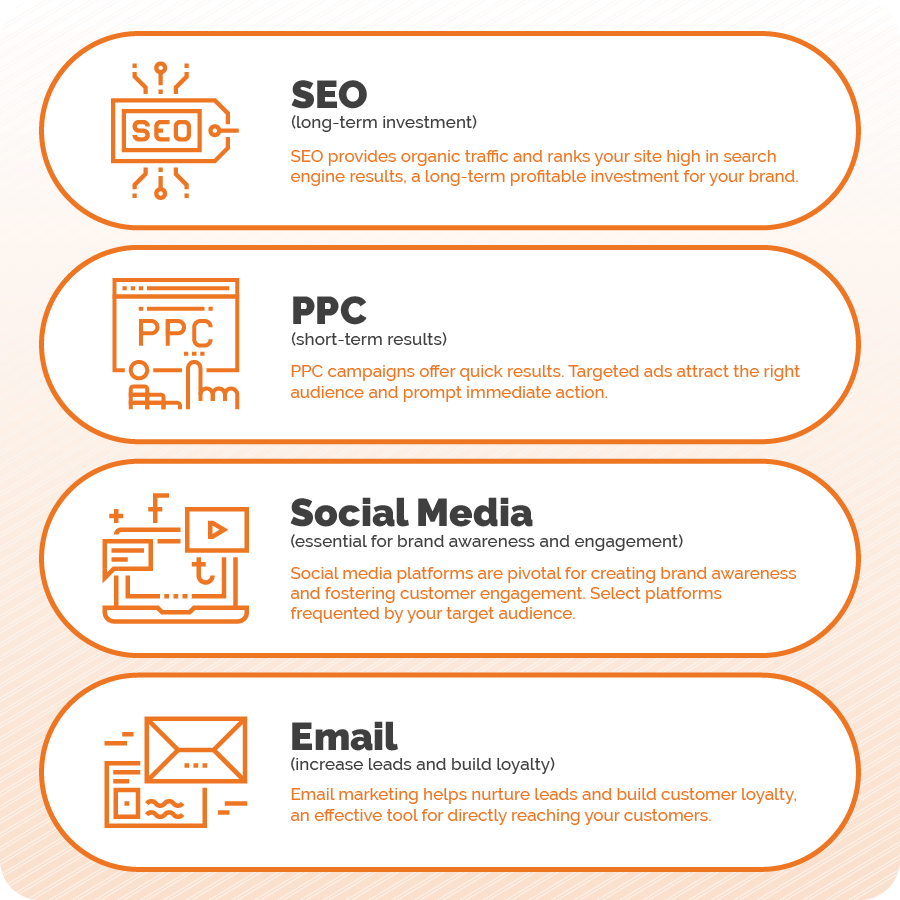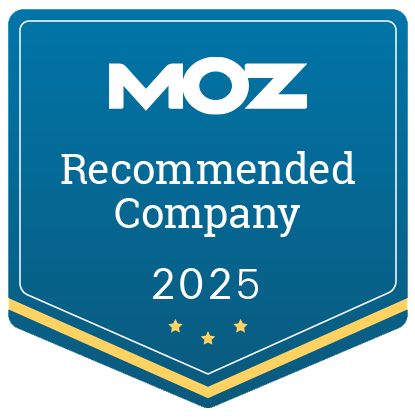Embarking on your digital marketing journey starts by crafting a strategic plan. Acknowledging the importance of a digital strategy encompassing diverse platforms and an omnichannel marketing approach allows you to connect with your audience to provide them with the content they’re searching for.
Use a marketing strategy template as your guide to start your marketing adventure as it will allow you to define target audiences, select the right communication channels, and set the desired objectives. Remember - first-time marketing does NOT mean haphazard actions: strategy establishes direction so you can carefully build your plan with precision.
Use these guidelines as roadmaps as they're here to pave the way for your successful voyage into digital marketing. Keep exploring, learning, and evolving in this vast digital landscape.
What is a Digital Marketing Strategy?
A digital marketing strategy provides a comprehensive plan for a business's online marketing activities. It integrates different components of digital marketing, including web marketing and omnichannel approaches. As you learn more about the marketing strategy world, it's essential to understand that a well-crafted digital marketing plan goes beyond an online presence.
A digital strategy uses various digital marketing examples, learning from their successes and failures. It's not just about repeating what others have done but about forging a unique path using insights from these examples.
So, to define your digital strategy, a marketing strategy template can be your go-to tool. It systematically assists in choosing the right digital channels, setting precise objectives, and defining your target audience.
Step-By-Step Guide to Starting Digital Marketing
Understand Your Audience
To initiate your first-time digital marketing strategy, understand your audience. Identify their demographics, interests, and behaviors. Use these insights in creating buyer personas and comprehensive profiles representing your ideal customers. Tailoring your message to resonate with your audience optimizes your digital strategy.
Set Your Digital Marketing Goals
Formulate measurable and time-bound digital marketing goals. Use the SMART (Specific, Measurable, Achievable, Relevant, Time-bound) framework in setting your objectives. This approach aligns your goals with business targets, contributing to your organization's overall success.
Choose the Right Digital Marketing Channels
Select digital marketing channels that best reach your audience. SEO, Social Media, Email, and PPC are key channels to consider.
-
SEO - Long-term Investment
SEO provides organic traffic and ranks your site high in search engine results, a long-term profitable investment for your brand.
-
PPC - Short-term Results
PPC campaigns offer quick results. Targeted ads attract the right audience and prompt immediate action.
-
Social Media - Essential for Brand Awareness and Engagement
Social media platforms are pivotal for creating brand awareness and fostering customer engagement. Select platforms frequented by your target audience.
-
Email - Increase Leads and Build Loyalty
Email marketing helps nurture leads and build customer loyalty, an effective tool for directly reaching your customers.
Create Engaging Content
A robust content marketing strategy works actively to set your brand apart and retain your audience’s attention. Start by crafting compelling, purposeful content that integrates high-quality writing with appealing graphics. Consistency in voice and aesthetics across all platforms solidifies your brand identity, making your content easily recognizable. Incorporate storytelling to connect on a deeper level, encouraging more profound engagement and interaction from your audience.
Develop a PPC Strategy
Creating a well-crafted PPC strategy is vital for driving targeted traffic and maximizing your marketing ROI. Begin by conducting thorough keyword research to identify terms that resonate with your audience and align with your business goals. Create compelling ad copy that grabs attention and encourages clicks while setting bids to optimize your budget. Be sure to continuously monitor and adjust your campaigns through data-driven insights to refine targeting. Remember: consistency in messaging and visuals is key to reinforcing brand recognition.
Optimize for Search Engines
To master SEO, begin with a solid foundation in keyword research, identifying terms that your audience frequently searches for. Incorporate these keywords naturally into high-quality, informative content, and regularly engage in link-building activities on your website to enhance your site’s authority and visibility. Stay updated with Google’s algorithm changes and adjust your strategies accordingly while keeping best practices for user experience on your site.
Leverage Social Media to Build Relationships and Engagement
Utilize the most suitable social media platforms based on where your target audience spends their time. Develop a strategic presence that goes beyond promotional posts to include content that educates, entertains, and engages users, fostering natural conversations. Utilize analytics tools provided by these platforms to tweak your strategy, ensuring you deliver the content your audience wants to see.
Email Marketing to Build Leads and Drive Conversions
Effective email marketing campaigns are crucial for generating leads and driving conversions. Craft emails with compelling subject lines to ensure they stand out in crowded inboxes. The content should be engaging and direct, with a clear call to action (CTA) that guides readers towards the next steps.
Measure and Analyze Your Digital Marketing Efforts
Incorporating analytics is key to understanding the effectiveness of your digital marketing efforts. Utilize tracking tools and metrics such as click-through rates, engagement levels, and conversion rates to monitor the performance of your campaigns. Regularly revising your strategy based on these insights ensures that your marketing efforts remain relevant and effective, maximizing ROI.
Adjust Your Strategy and Adapt to Algorithms
The digital landscape is ever-evolving, with frequent changes in algorithms that can impact visibility and engagement. Stay flexible in your marketing strategies to quickly adapt to these changes. Stay informed about the latest trends and algorithm updates, often provided through industry blogs and forums.
Start Your Trek to Success with a Digital Marketing Agency
Navigating the challenging terrain of digital marketing strategy requires an understanding of the importance of an omnichannel approach and the roles of web marketing and social media. It begins with grasping the audience's needs and setting clear goals. The power of SEO, social media, email, and PPC plays a crucial role in crafting compelling content that resonates with the target audience. Adapting to ever-changing algorithms may not be easy, but it is essential for achieving long-term success in the digital world.
It's time to put all this knowledge into action! With a solid strategy and a willingness to adapt, you're ready to embark on your digital marketing journey. Remember, a good digital marketing agency can be your guide. Contact us today to learn more about our work and how Zero Gravity Marketing can create solutions that work for you.
About the Author:












